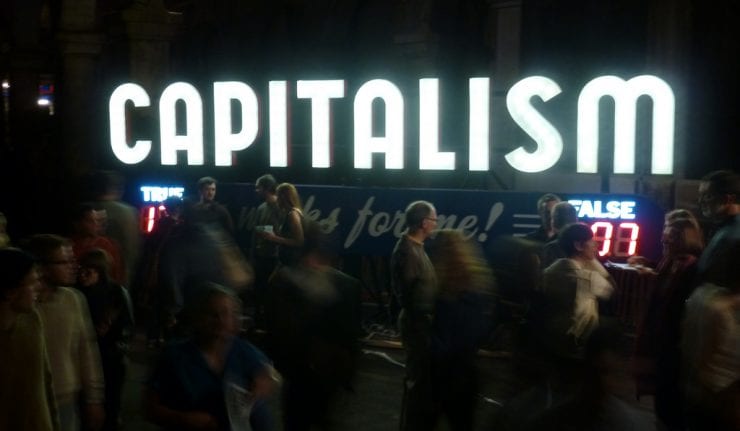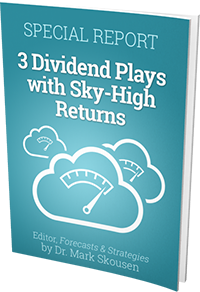At FreedomFest, I debated University of Illinois Professor Deirdre McCloskey on her book, “Bourgeois Equity: How Ideas, Not Capital or Institutions, Enrich the World” (University of Chicago Press, 2016), which is her third “Bourgeois” book defending middle-class capitalism.
We had a great time in our intellectual debate. That’s what I like about FreedomFest — it’s all about “great ideas, great books and great thinkers.”
In her book, she berates me and other friends of liberty for defending the importance of “capital” in capitalism. Having suffered through and occasionally profited from numerous private placements and high-risk investment opportunities over the decades, I argue that inventors are always in desperate search of investment capital, and if funds were more plentiful, more new ideas could be tested in the marketplace. In other words, capital is what capitalism is all about.
But Professor McCloskey demurs. She rejects my statement that “the scarcity of investment capital has kept us from advancing as fast as we could.”
All we need is more and better “how to” ideas in technology and production processes, she claims. In the “Bourgeois Equality” tome, she insists, “Our riches were made not by piling brick on brick, bank balance on bank balance, but by piling idea on idea,” specifically the theological and political revolutions in the European West that spurred on entrepreneurship, technology and innovation.
She firmly believes that if you have a great idea, the money will come. Historically, she writes, “The ideas were so good that financing was seldom a problem.” According to Professor McCloskey, injecting foreign capital into an emerging economy from either government or the private sector may have no impact on growth. “Don’t give China a cent, yet it succeeds.”
Say again? In the early 1980s, China had all the technical know-how to advance agriculture and industry. However, nothing happened until the Chinese freed their economy and invited billions of dollars in foreign multinational investment. Then and only then did China’s economy suddenly take off.
As Ludwig von Mises so eloquently wrote in his chapter on foreign investment in his book “Economic Policy,” developing countries aren’t poor because they are ignorant about technology, rather “the difference is the supply of capital, the quantity of capital goods available. A country becomes more prosperous in proportion to the rise in the invested capital per unit of its population.”
Of course, as New York University Professor Bill Easterly has demonstrated, investment capital must be productive in order to lead to higher standards of living. The World Bank and development economists have learned this lesson the hard way.
My fear is that if Professor McCloskey convinces everyone that only ideas matter, people will no longer feel the need to save and invest. Worse, if investment capital doesn’t really make that much difference, why not tax it away? I wonder what Mises, Böhm-Bawerk and other defenders of saving and capital would say about that?
Inventors Need Investors!
I disagree with Professor McCloskey’s extreme thesis. In 1930, Joseph Rossman, long-time examiner at the U.S. Patent Office, surveyed more than 700 inventors. He found that the three biggest motivators were “love of inventing,” “desire to improve,” and “financial gain.” His survey showed that the largest obstacle perceived by patent seekers was not lack of knowledge (ideas), legal difficulties, lack of time, or even opposition to an inventor. Overwhelmingly, the largest obstacle faced by early twentieth century inventors was “lack of capital.” Inventors need investors!
Raising capital for a great new idea is much more difficult than McCloskey realizes. It’s not unlike a first-time novelist finding a publisher. Ayn Rand received numerous rejection letters before she found a publisher for “The Fountainhead.” As one wrote, “This is a work of almost-genius. I wish there were an audience for a book of this kind. But there isn’t. It won’t sell.”
Without Michael Boulton’s financial assistance, how many more years would it have taken for James Watt to develop his breakthrough separate-condenser steam engine? As historian William Rosen states, “Watt needed capital. Investment capital, however, wasn’t easy to find in 1765 Britain; and it was a lot harder than it had been fifty years earlier…[after] the collapse of the South Sea Company.” It look 11 years to build a successful prototype even with Boulton’s financing and his Soho factory.
And if it wasn’t for the financial support of J. P. Morgan, how many more experiments would have been necessary before the New Jersey “wizard” Thomas Edison created a workable light bulb?
There is no shortage of innovative ideas out there, as anyone can see from watching a few episodes of “Shark Tank.” The problem is funding these projects. Over 40,000 entrepreneurs apply to appear every year, and only 100 make on the show. Less than half walk away with a deal, and, of those, only around 43% eventually complete a transaction with one of the Sharks. To convince wealthy investors to put up their hard-earned wealth to finance a crazy new idea is not as easy as academics think.
Granted, new technologies, innovations and other great ideas are absolutely necessary for advancing civilization. But they require more. For a country to succeed, it needs both innovative ideas and productive capital, and plenty of it.
And, despite Professor McCloskey’s protests, a country also needs institutions to succeed. As William Rosen points out in his book, “The Most Powerful Idea in the World: A Story of Steam, Industry and Invention” (Random House, 2010), the great leap forward in the Industrial Revolution was largely due to the English finally codifying patent law, and therefore making great inventions like the steam engine profitable for inventors and their financial backers.
Capitalism Is All about Capital!
Personally, I like the term capitalism as a reference to free enterprise. Marx got it right in focusing on what really drives economic performance and a higher standard of living. Rather than focus on land, labor, or natural resources to achieve economic success, we should encourage capital formation, which, broadly defined, is all about saving, investment, entrepreneurship, innovation, technology and all things on the supply side of the economy.
In sum, to make capitalism work and increase our standard of living, we need all three — ideas, capital and institutions.
FreedomFest Audio Recordings Are Now Available at a Super Discount
Want to hear the debate, as well as 250 other sessions at this year’s big show? Call Harold at Ensign Publishing, toll-free 1-866-254-2057, to buy all the recordings for half off, only $162.50, by using the code 50off2018. Or go to www.miracleofamerica.com.
Upcoming Conferences
Join me at the San Francisco MoneyShow, Aug. 23-25, Hilton Union Square:
I’m scheduled to debate Mike Turner again on “Buy and Hold vs. Market Timing.” Plus, listen to Jim Woods (Fast Money Alert), Jeffrey Saut (Raymond James), Gene Simmons (KISS co-founder, vocalist and bass guitarist), John Buckingham, Neil George, Marilyn Cohen and Kelley Wright. To get your free tickets, call 1-800-970-4355 and be sure to mention code 045690.
Toronto MoneyShow, Sept. 14-15, InterContinental Toronto Centre: I will have a main stage appearance on “Everything You Need to Know about the Markets,” as well as a breakout session on “The SWAN Strategy: My Five Low-Risk Ways to Earn High Dividends and Capital Gains.” Other speakers include Kim Githler, Tom Sosnoff and Gene Simmons. To register and attend for free as my subscriber, call 1-800-970-4355 and mention priority code 045972. Or go to MarkSkousen.TorontoMoneyShow.com.
You Blew It!
Trade War Backfires — Causes U.S. Deficit to Balloon Another $12 Billion
I have good news and bad news regarding the ongoing trade war.
The good news comes first: the European Union quietly signed an agreement with Japan to end 99% of all tariffs between the two regions. Free trade works!
Now for the bad news: Farmers in the Midwest are up in arms about the higher tariffs they are now paying to ship their agricultural products to China and elsewhere. So, the Trump administration just announced a $12 billion aid package for farmers hurt by the trade war. That’s $12 billion the government doesn’t have, so it will have to borrow the money.
Trade war is a “lose, lose” proposition. Free traders in the White House are hoping to convince Trump to reduce tariffs on both sides, rather than increase them. That’s the real solution.
Senator Bob Corker (R-Tennessee) said it best: “You have a terrible policy that sends farmers to the poorhouse, and then you put them on welfare, and we borrow the money from other countries.”




